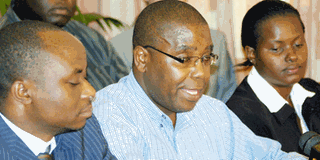ICJ: State has upto Sept 30 to set up tribunal

The executive director of ASADHO Georges Kapiamba (left) from the Democratic Republic of Congo and Juliet Nyakianzi (right) from Uganda's Foundation for Human Rights (FRHI) follow the proceedings as the chairman of the International Commission of Jurists (ICJ) Kenya chapter Wilfred Nderitu (centre) addresses a press conference at the Sarova Whitesands Beach Resort in Mombasa. The East African ICJ chapter, who were closing a three-day joint workshop, has supported chief mediator Kofi Annan's move to hand over the list of suspects to the International Criminal Court.
The Government has until September 30 to prove that it is committed to setting up of the special tribunal to try perpetrators of the 2008 post election violence, failure to which the International Criminal Court (ICC) might take over prosecutions.
The International Commission of Jurists (ICJ) Kenya chapter now wants the government to swiftly move into action and stop dilly dallying over the establishment of a special tribunal as recommended by the Waki Commission.
“There has been a misunderstanding about the agreement between ICC Prosecutor Moreno-Ocampo and the Kenyan delegation that the government has 12 months to set up the tribunal but that is not the case,” ICJ chairman Wilfred Nderitu said yesterday.
The chairman was addressing a press conference at the Whitesands Beach hotel where the ICJ is holding a workshop for its officials drawn from the region with representatives from Rwanda, Uganda, Tanzania, Democratic Republic of Congo and Southern Sudan.
The ICJ judgment is based on statements of the agreement he availed to the media, requiring the government to provide the ICC with, among other things, “a report on the current status of investigations and prosecutions arising out of post-election violence requested by the prosecution to perform its preliminary examinations.”
The ICC has also asked for information on measures put in place to ensure the safety of victims and witnesses pending the initiation and completion of suitable judicial proceedings.
Signed by Moreno-Ocampo for ICC and Mutula Kilonzo (Justice minister) James Orengo (Lands) and Amos Wako (Attorney General) for the government, the statement also demands that information on modalities for conducting national investigations and prosecutions be provided to the ICC.
“By September 30 if there will be nothing to assure ICC that the tribunal will be set up, then in our view Moreno-Ocampo will take over the prosecutions,” he said, adding that ICJ supports the handing over by former UN secretary general Kofi Annan of the secret envelope containing names of the perpetrators to Mr Moreno-Ocampo.
Mr Nderitu said the government’s implication that a special division of the high court would be an alternative to the special tribunal was unacceptable because the system would be under the AG which would give him leeway to terminate cases.
“As evidenced in the numerous interventions [Mr Wako] has made on behalf of his political friends when they face corruption charges, the AG is likely to enter nolle prosequi if any highly placed official is brought to court in connection with the post election violence,” he said.
He noted that the police do not have the capacity to conduct proper and credible investigations, preserve evidence for the crimes committed and secure convictions.
“A move to establish a tribunal short of the one recommended by the commission will not only be serving the interests of the political elite who do not want to see justice but it will be a serious denial of redress for the many victims of the violence,” Mr Nderitu added.




